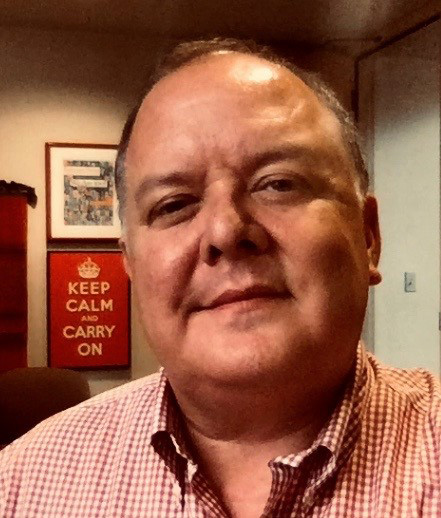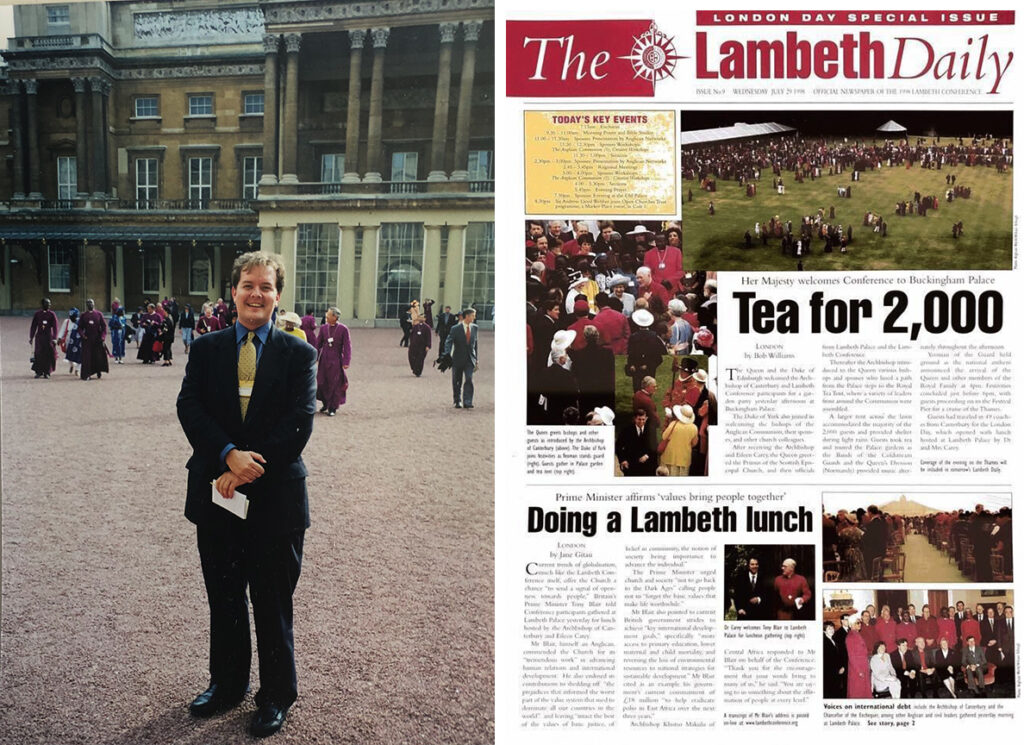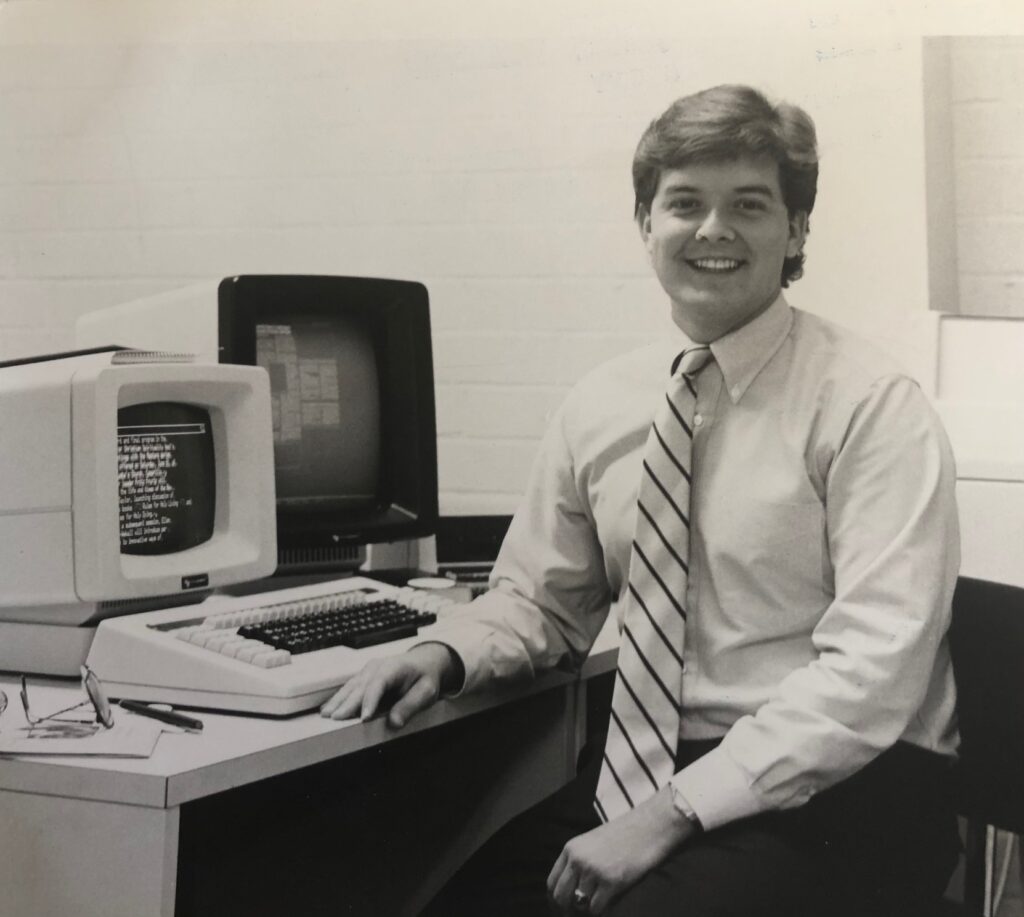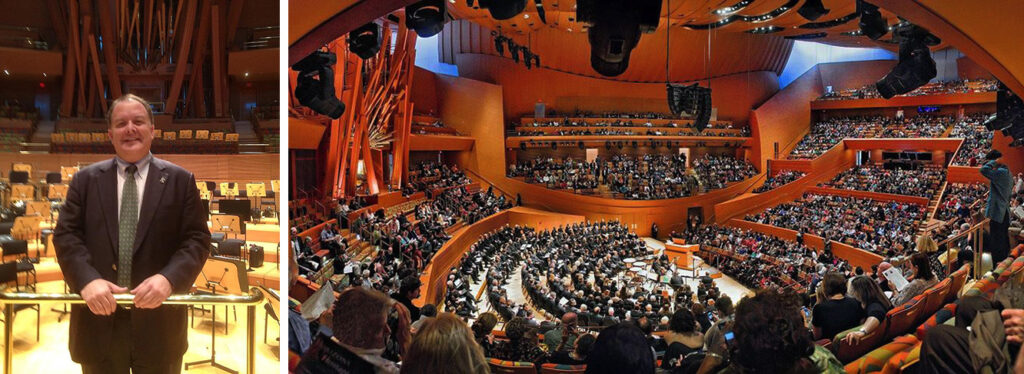
Bob Williams, pictured in the fall of 2020.
The most interesting Ash Wednesday Bob Williams ever spent began in the Havana government offices of former Cuban leader Fidel Castro.
Williams, Canon for Common Life and head of the Diocese of Los Angeles communications office, is celebrating 35 years as a church journalist and public relations officer – a ministry of reporting news stories from as far away as Africa, Asia, Europe, the Middle East, across the Caribbean and the Americas to as near as the Southland.
“We are keepers of one another’s stories, given the privilege to tell them and to be able to pass them along,” says Williams. In his role as historiographer and archivist, he hopes to complete “Horizons and Heritage,” a historical look back at the diocese, by 2024. He frequently recalls Southland saints during the diocesan staff’s online weekday morning prayer; on a recent morning, he offered prayers of thanksgiving on the 30th anniversary of the consecration of retired Bishop Suffragan Chet Talton.
Williams’ vocation “is an amazingly rich tapestry of gifts – writer, editor, and historian; ecumenical and interfaith leader; exemplar, and evangelist of the best of the true Anglican Episcopal tradition,” said Los Angeles Bishop Diocesan John Harvey Taylor. “I rely on his counsel, friendship, and kindness each day. He brings such energy to his ministry that, although he’s been on the job in Los Angeles and New York for 35 years, it feels like he’s just getting started.”
One night in Havana
Williams met Castro during a few years’ hiatus from his first love, the Southland’s Episcopal Diocese of Los Angeles, having answered the call to serve with the then-presiding bishop of The Episcopal Church, the Most. Rev. Frank Griswold.
“It was one of many amazing adventures with Bob,” Griswold said in a Feb. 15 telephone interview with The Episcopal News. “I had preached in the cathedral and had said that The Episcopal Church … opposed the U.S. embargo of Cuba on humanitarian grounds.”
“About 10 p.m. that evening, we were having dinner with the bishop and there was a phone call that El Comandante wanted to meet, and off we went,” Williams recalled.
That evening, Castro, “described the country’s 98% literacy level, its social service system, and was very proud of the way the Gospel had been put into action,” Williams said. “I never took notes so fast in my life, in Spanish.”
Williams captured the moment perfectly, according to Griswold and Barbara Braver, who was the presiding bishop’s assistant for communications. Each described Williams as a consummate professional with wonderful senses both of vocation and of humor.

Bob Williams was editor of The Lambeth Daily at the 1998 Lambeth Conference, the once-a-decade gathering of bishops of the Anglican Communion. Photos courtesy of Bob Williams.
“Bob is such a warm human being,” Griswold said. “You do need a sense of humor at times to regain your balance or some perspective … (as) an important way of registering things when they were intense.”
Braver agreed. “Bob takes his work seriously, but doesn’t take himself seriously, so there are always a lot of laughs along the way. His vocation is part of his drive, wanting to make things work for the greater good,” she said during a telephone interview from her Gloucester, Massachusetts, home. “He has a real commitment to people, a sense we’re in this together, that he’s been given certain gifts and he’s called to use them for the common good.”
The Rev. Canon Jim Rosenthal, speaking from England, recalled witnessing those gifts at work in 1998 when Williams excelled as editor of the Lambeth Daily newspaper. “Bob had a challenging task from day one of the Lambeth Conference as the important daily sentinel to the widely diverse gathering of spouses and bishops,” said Rosenthal, retired director of communications for the Anglican Communion and editor of Anglican World.
“May he continue his journey surrounded by the cloud of communicators – local, national, international – who have appreciated working with this dear man.”

The late Canon Ruth Nicastro hired Bob Williams in 1986 as assistant editor of The Episcopal News, just after he graduated from USC with a master’s degree in journalism. Photo: Courtesy of Bob Williams
A legacy of journalism
In 1986, Williams called the diocese to add his name to the mailing list and so impressed then-communications director Ruth Nicastro, she hired him. “She asked if I knew how to use a Compugraphic typesetter, and I did,” he recalls laughingly.
Nicastro became a mentor for Williams, a fourth-generation Californian born in Escondido. He and his sister, Wendy Vurik, were raised by their maternal grandparents, Betty Perry and Bud Markert, mostly in the San Diego area after their mother’s death when they were ten and five, respectively.
“Betty was a journalist and my grandfather, Bud, owned and operated a lumberyard,” said Williams, who from an early age felt a vocational call to teaching. Perry was an Episcopalian by way of England, Canada, Minnesota and then Los Angeles, but Williams claimed his heritage after a 1980 visit to San Francisco’s Grace Cathedral. He has served on the vestry of St. James’ in-the-City Church, Los Angeles, since 2019.
As Canon for Common Life, Williams oversees an extensive network of media, civic and community responsibilities. His days – even when working remotely in the time of Covid-19 – begin early and frequently end late.
On a recent morning, Williams connected various Southland congregations with an L.A. Weekly reporter pursuing a story about how “Ashes to Go” reflects a changing church. Any given day, he organizes meetings, serves as a diocesan spokesperson, represents the bishops on interfaith councils, nonprofit agencies, and civic bodies on issues ranging from affordable housing to Taylor’s recent policing and community safety task force initiative.
Civically, he is secretary of the Los Angeles Council of Religious Leaders. Mayor Eric Garcetti appointed him to Los Angeles’ Commission on Disability.
Williams is also the go-to person who typically secured affordable rates for churches advertising Easter and Christmas services. He consults with congregations regarding media strategy, as well as guiding clergy through sudden, shocking crises like the 2019 Saugus High School shooting in Santa Clarita.
“I had only been at St. Stephen’s for a few months at that point and had little to no experience with dealing with this type of tragedy from a pastoral or community resource perspective,” Christopher Montella, rector of the Santa Clarita parish, recently told The News. “Bob immediately jumped in and not only offered sound tactical advice, he also dropped what he was doing, the day before diocesan convention was to open, to serve as St. Stephen’s communications representative, helping to make sure we had a clear and visible message to the Santa Clarita community while we scrambled to make sure our parishioners were safe and as we rushed to put together a prayer vigil for that evening.
“Personally, to say I am not sure how I would have navigated that day without him is an understatement.”

Bob Williams produced the 2015 concert at Los Angeles’ Disney Hall in celebration of the 150th anniversary of parish ministry in the region that is now the Diocese of Los Angeles. Williams says he counts that day among his favorite memories. Photos: Courtesy of Bob Williams
Among his favorite diocesan stories: inspirational leaders like Canon Ruthie Leonard, who ran the afterschool program at St. Martin’s, Compton, and the late Rev. Canon Dr. John H. Misao Yamazaki, first vicar and longtime rector of St. Mary’s Mariposa, who picked up children for Sunday school with a horse and wagon and pastored during the 1918 influenza epidemic. He also remembers the late Lynn and David Angell, the latter a producer of the “Frazier” television series, with whom Williams served on the board at Hillsides, and who died in the first plane crash of Sept. 11, 2001.
There also are memories of Canon Jack Plimpton, who founded Project New Hope’s affordable housing complexes for those living with HIV/AIDS and responding to the 1992 civil disturbances after the Rodney King beating, and subsequent conversations leading to creation of the Episcopal Community Federal Credit Union, an economic justice ministry.
Ann Seitz, a diocesan council member and parishioner at Emmanuel, El Monte, appreciates Williams’ historical perspective and kindness when remembering her father, the late Howard Hoover, a New Yorker magazine advertising manager and “volunteer public relations person for Bishop Bloy for many, many years, before the diocese actually had a communications department.”
Williams reminded Seitz of her father’s pivotal role “as editor of the Episcopalian magazine. He [Williams] has done a really good job for the diocese.”
Angus Mackay, former diplomacy director at the British Consulate-General in Los Angeles, remembers joining forces with Williams “to help with the media arrangements and eulogy for the Los Angeles Memorial Service for the late Diana, Princess of Wales.”
On a more local, congregational level, “We worked together to help navigate a difficult relationship between a local parish and community groups – as well as a city council member’s office – over the siting of a cell phone tower,” Mackay said.
Service to youth through Hillsides, NYA
As a diocesan staff liaison for Hillsides, Williams met Marisol Barrios 20 years ago, and later convinced her to chair the Program Group on Communications and to join the board of Neighborhood Youth Association (NYA).
“I’ve always been impressed by his commitment to youth,” said Barrios, who then was director of communications for the residential center for children. “He is extremely gracious and has such a compassionate viewpoint. He expresses himself to others in such a way that is very comforting, welcoming and truly engaging with them (that) … others are easily enrolled in what he does.”
Williams serves as NYA board president, a role separate from his diocesan responsibilities, a labor of love reprising his own mentoring experiences and an early vocational call to teach.
“Many of my own key mentors – Ruth Nicastro, Peter Mann, Bishop Fred Borsch – were long active as volunteer leaders of NYA, which dates from 1906 as the oldest continuing institution of the Diocese of Los Angeles, and whose mission is 100% college placement and mentoring for under-resourced students in low-income families,” he said, underscoring Bishop J. Jon Bruno’s role in saving NYA in 2015 after financial difficulties.
Board member Sarah Newman, a St. Matthew’s, Pacific Palisades, parishioner, said Williams “is a leader who embodies NYA’s slogan, ‘together we succeed.’ I knew Bob through my father, Peter Mann [late treasurer and missioner for administration for the diocese]. Bob has touched so many lives.”
She recalls one young life in particular, third grader Amabel Mendez, who was so taken with Williams she insisted on introducing him at a virtual Zoom event last May.
“Bob inspires communication and collaboration and enables us to keep going,” Newman added. “Every month, it seems, we’re down on money and some challenge happens that seems insurmountable. But his grace, caring, good-natured and empathetic, organized, calm, wise, even-tempered, perceptive, irreplaceable and faith-filled response creates a synergy, an opening and sharing of ideas that allows the Holy Spirit, literally, to step in.”
Williams and Vurik also fund the NYA Betty Perry Scholarship in honor of their grandmother, Newman said. The 2020-2021 academic year recipient, Jessica Mejia, a second-year student at Mount Saint Mary’s University, wrote in a recent appeal: “NYA became a shining light to us. With NYA’s food drives, my mom was able to save the money she would spend on groceries. She was relieved to know that our next meal wouldn’t be sacrificed for a place to live, our internet bills or running water.”
Building a legacy
Rose Hayden-Smith is a newer member of the Program Group on Communications but the St. Paul’s, Ventura parishioner says she has known Williams for many years. “During this pandemic, he has really demonstrated creative leadership. It is really all about discipleship. It’s one of the reasons he’s deeply loved by clergy, by laity. He knows everyone and he listens to people’s stories.”
Says colleague and Episcopal News editor Canon Janet Kawamoto: “Bob has had a remarkable, varied, ever-growing record of service at the diocese. His influence on its public face continues to be profound. No one has taken more care to build up its presence in the wider Episcopal Church, in civic life and especially in local ecumenical and interreligious affairs. He’s building a great and lasting legacy.”
Payton Hoegh, a diocesan communicator, said Williams’ mentorship has been a blessing, for him and for many. “The impact Bob has made through his work with the Episcopal Diocese of Los Angeles will be felt for countless decades to come,” Hoegh said. “The bright future of our diocese is built upon the dedicated service of people like Bob Williams. As we step into that future, we truly stand on the shoulders of giants.”
